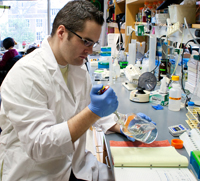This multi-disciplinary post-doctoral research training program in diabetes & endocrinology is an integral component of the training activities of the the Vanderbilt University School of Medicine & the Vanderbilt Diabetes Center. It derives support from a T-32 training grant from the National Institute of Diabetes and Digestive & Kidney Diseases at the National Institutes of Health. Its goal is to provide post-doctoral trainees with the knowledge & skills required for independent clinical or basic science research careers.

M.D. trainees are encouraged to acquire a firm foundation in the basic sciences, but also to select projects in translational or clinical research areas. Ph.D. trainees are urged to relate their research to health-oriented problems. M.D. trainees usually have two or three years of residency training before entering the program. Ph.D. trainees have typically just received or are one year out from their doctorate. Trainees are selected on the basis of demonstrated research interests & especially on their potential as future researchers & educators. Training positions are allocated approximately equally between M.D.'s and Ph.D.'s.

The two year training program utilizes the preceptor approach, in which the trainee develops a research project under the guidance of a faculty preceptor. Typical research topics include hormone action in humans as it relates to diabetes, intermediary metabolism, micronutrient effects on metabolic disease, metabolic regulation, molecular genetics of metabolic diseases, & translation of diabetes care delivery. In over three decades of NIH support, the program has supported more than a hundred trainees, & over seventy percent have chosen careers in academia, industry, or government.